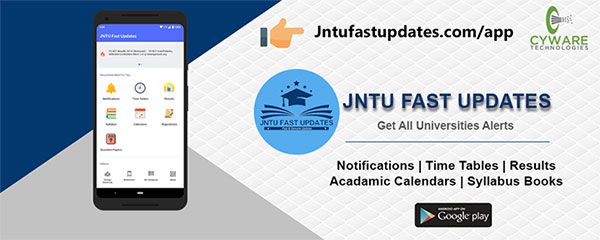JNTUK R19 3-1 Concrete Technology Material/Notes PDF Download
Students those who are studying JNTUK R19 Civil Branch, Can Download Unit wise R19 3-1 Concrete Technology Material/Notes PDFs below.

JNTUK R19 3-1 Concrete Technology Material/Notes PDF Download
OBJECTIVES:
- To learn concepts of Concrete production and behaviour in various environments.
- To learn test procedures for determination of properties ofconcrete.
- To understand durability properties of concrete in various environments.
UNIT-1
Ingredients of Concrete : Portland cement – Chemical composition – Hydration, Setting times, Fineness, Structure – Tests on cement for physical properties – Grades of cements – Admixtures – Mineral and chemical admixtures – accelerators, retarders, air entrainers, plasticizers, super plasticizers, fly ash and silica fume.
Aggregates: Classification – Particle shape & texture – Bond, strength & other mechanical properties – Specific gravity, Bulk density, porosity, adsorption & moisture content – Bulking of sand –Deleterious substance – Soundness – Alkali aggregate reaction – Thermal properties – Sieve analysis – Fineness modulus – Grading curves – Grading of fine & coarse Aggregates – Gap graded and well graded aggregate as per relevant IS code – Maximum aggregate size. Quality of mixingwater.
Download UNIT-1 Material PDF | Reference-2
UNIT-2
Mix Design and Fresh Concrete
Mix Design: Factors affecting mix proportions – Durability of concrete – Quality Control of concrete – Statistical methods – Acceptance criteria – Concepts Proportioning of concrete mixes by IS method.
Fresh Concrete: Production of Concrete–mix proportion, mixing, placing, compaction, finishing, curing – including various types in each stage. Properties of fresh concrete – Workability – Factors affecting workability – Measurement of workability by different tests, Setting times of concrete, Effect of time and temperature on workability – Segregation & bleeding – Mixing and vibration of concrete, Ready mixed concrete,Shotcrete
Download UNIT-2 Material PDF | Reference-2
UNIT-3
Hardened Concrete: Water – Cement ratio – Abram’s Law – Gel space ratio – strength of concrete –Maturity concept – Strength in tension & compression – Factors affecting strength – Relation between compression & tensile strength – Curing, Testing of Hardened Concrete: Compression tests – Tension tests – Factors affecting strength – Flexure tests –Splitting tests – Non-destructive testing methods – code provisions for NDT.
UNIT-4
Elasticity, Creep & Shrinkage, Modulus of elasticity, Dynamic modulus of elasticity, Poisson’s ratio, Creep of concrete and factors influencing creep, Relation between creep & time, Nature of creep, Effects of creep – Shrinkage –types of shrinkage.
Download UNIT-4 Material PDF | Reference-2
UNIT-5
Special Concretes: Ready mixed concrete, Shotcrete, Light weight aggregate concrete, Cellular concrete, No-fines concrete, High density concrete, Fibre reinforced concrete, Different types of fibres, Factors affecting properties of FRC, Polymer concrete, Types of Polymer concrete, Properties of polymer concrete, High performance concrete–Self compacting concrete, SIFCON, self healing concrete.
TEXT BOOKS:
- Concrete Technology, M. S. Shetty. – S. Chand & Company
- Concrete Technology, A. R. Santhakumar, Oxford University Press, NewDelhi
REFERENCE BOOKS:
- Properties of Concrete, A. M. Neville – Pearson – 5thedition
- Concrete, Microstructure, Properties and Materials by P.K.Mehta and Moterio, McGraw Hill
- Concrete Technology, M.L. Gambhir. – Tata Mc. Graw Hill Publishers, NewDelhi
OUTCOMES:
- understand basic concepts of concrete. x realize importance of quality ofconcrete.
- familiarize basic ingredients of concrete and their role in concrete and their behaviour in thefield.
- test fresh concrete properties and hardened concreteproperties.
- evaluate ingredients of concrete through lab tests. design concrete mix by ISmethod.
- familiarize basic concepts of special concrete and their production and applications. understand the behaviour of concrete in variousenvironments.

320-x100(1).gif)
